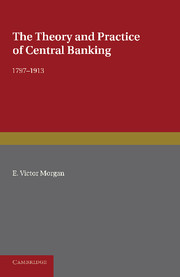Book contents
- Frontmatter
- Contents
- Tables
- Editorial Preface
- Author's Preface
- Chapter I Banks and Banking in the Early Nineteenth Century
- Chapter II The Bank Restriction Period, 1797–1821
- Chapter III Monetary Theory of the Bank Restriction Period
- Chapter IV The First Years of Resumption, the Crisis of 1825, and the Bank Charter Act, 1833
- Chapter V The Horsley Palmer Experiment, and the Bank Charter Act, 1844
- Chapter VI The Currency and Banking Controversy
- Chapter VII The Trial of the Bank Charter Act, 1844-58
- Chapter VIII The Great Boom, 1858-73
- Chapter IX The Great Depression, 1873-96
- Chapter X The Last Years of the Gold Standard, 1897–1913
- Chapter XI Monetary Theory of the Second Half of the Nineteenth Century
- Appendix Changes in Bank rate, 1876-1913, with the Amount of the Reserve of the Banking Department and the “Proportion” on the preceding Wednesday
- Index
Chapter IV - The First Years of Resumption, the Crisis of 1825, and the Bank Charter Act, 1833
Published online by Cambridge University Press: 05 June 2016
- Frontmatter
- Contents
- Tables
- Editorial Preface
- Author's Preface
- Chapter I Banks and Banking in the Early Nineteenth Century
- Chapter II The Bank Restriction Period, 1797–1821
- Chapter III Monetary Theory of the Bank Restriction Period
- Chapter IV The First Years of Resumption, the Crisis of 1825, and the Bank Charter Act, 1833
- Chapter V The Horsley Palmer Experiment, and the Bank Charter Act, 1844
- Chapter VI The Currency and Banking Controversy
- Chapter VII The Trial of the Bank Charter Act, 1844-58
- Chapter VIII The Great Boom, 1858-73
- Chapter IX The Great Depression, 1873-96
- Chapter X The Last Years of the Gold Standard, 1897–1913
- Chapter XI Monetary Theory of the Second Half of the Nineteenth Century
- Appendix Changes in Bank rate, 1876-1913, with the Amount of the Reserve of the Banking Department and the “Proportion” on the preceding Wednesday
- Index
Summary
FALLING PRICES, 1821–4
The price fall, which had begun in 1819, continued with but slight interruption until 1824. The general index, 150 at the end of 1818, fell to 120 at the beginning of 1821, to 112 in the third quarter of 1822 and, after a slight rally in 1823, to 104 in the third quarter of 1824. Wheat prices fell disastrously in 1821 and 1822, but then recovered somewhat.
In the second quarter of 1821, when cash payments were resumed, the average circulation of Bank notes had been £22.9 mn.; a year later the figure was only £ 17. 3 mn., but a large quantity of coin had been issued, so that the combined circulation of notes and coin had almost certainly increased. This decline was balanced chiefly by the decline in government securities, as the government completed the repayment of the promised £10 mn. Commercial discounts remained fairly constant at a very low level, and bullion, in spite of the large issue of coin, fell by less than £ 2 mn.
Ricardo blamed the Bank for the too rapid contraction of their issues. During the resumption debates he had said:
The Bank should only reduce their issues cautiously; he only feared that they would do it too rapidly. If he might give them advice, he should recommend them not to buy bullion, but, even though they had only a few millions, if he had the management of their concerns, he should boldly sell. Every sale would improve the exchanges and, until the price of gold fell to £3. 17s. 6d., there was no necessity for the Bank to make any purchases at all.
In the years that followed, Ricardo often returned to this point, and emphasised that the evils of the time arose from the Bank's not having followed his advice.
Tooke, on the other hand, maintained that the act of 1819 was quite inoperative. In his usual manner he points out discrepancies in time between changes in the note circulation and in prices.
- Type
- Chapter
- Information
- The Theory and Practice of Central Banking, 1797–1913 , pp. 75 - 99Publisher: Cambridge University PressPrint publication year: 2013

